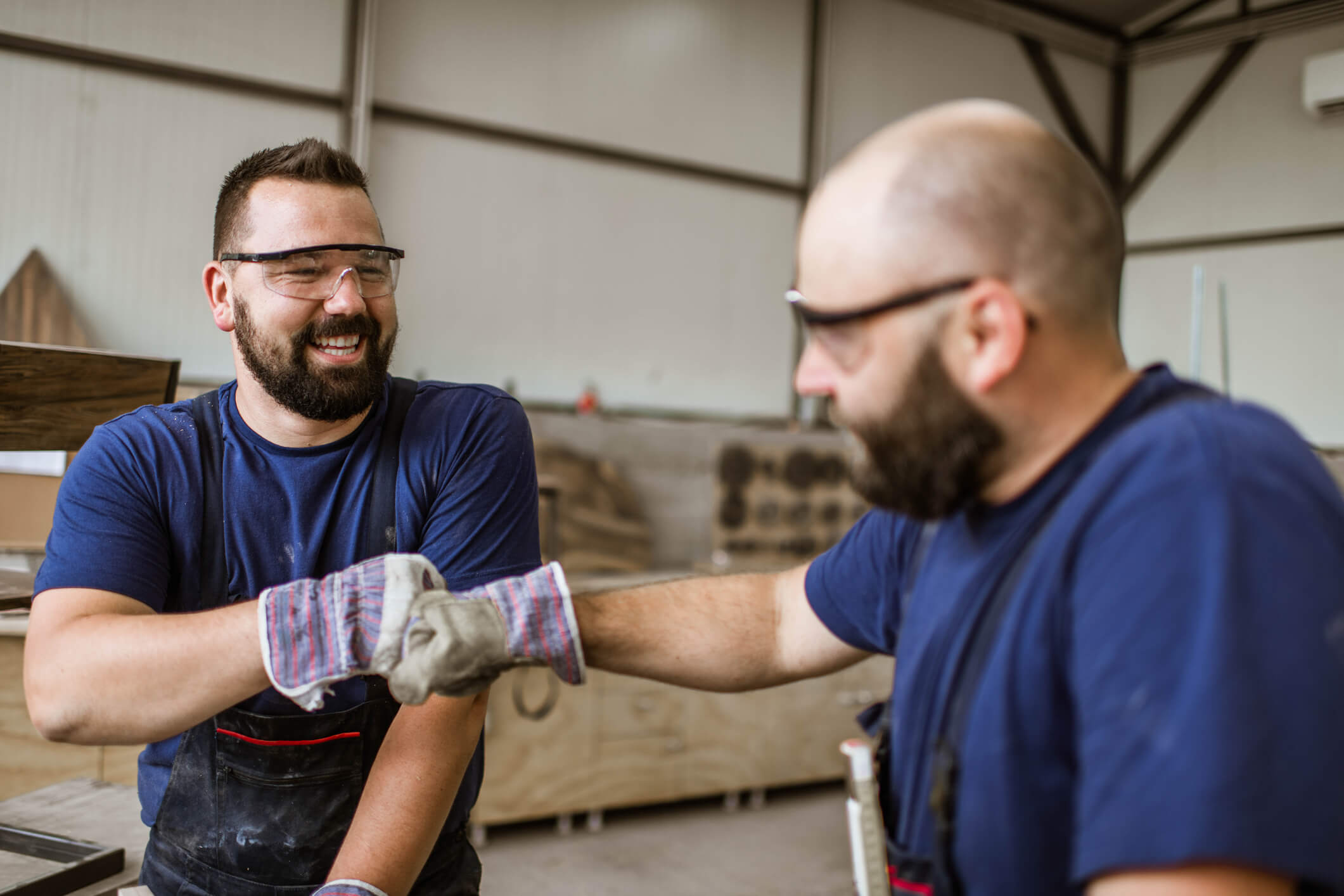Here’s an overview of some of the best accountability tools for Christians, based solidly on biblical teaching, with practical suggestions for how to use them.
Article at a Glance:
Do we need accountability tools?
At Covenant Eyes, we believe accountability is a critical ingredient in the recipe to overcome porn. More importantly, we believe that accountability is vital to the Christian life—not just for those of us struggling with porn or some other unwanted vice.
Over the years, however, a number of people have challenged us on these core beliefs. They’ve challenged the need for accountability and accountability tools.
Let’s look at three of these.
Why not just get rid of our technology?
If the internet is so bad and pornography is so easily accessible, shouldn’t we just get rid of the temptation? Ditch the smartphones. Swap the tablets for a good old-fashioned legal pad.
Even ten years ago, this was more of an option than it is today. However, from childhood to adulthood, our society has integrated computers and smartphones.
Data suggest that upwards of 80% of jobs now involve using a computer.1
For many of us, even if we wanted to get rid of our technology, we depend on it to support ourselves and our families.
Shouldn’t we just block the porn?
A more common approach today is to try to eliminate the problematic aspects of our technology—just block the porn from coming in. Certainly, it is wise for parents to take steps to protect the digital devices that their children can access.
But is blocking porn any more realistic than getting rid of the technology completely? Evidence suggests it is not—especially for teens and adults who have already been exposed to porn. One study found that in some cases, using porn filters can actually motivate people to seek out porn.
This has led us to our conviction that accountability relationships are essential for overcoming the challenge of pornography.
Isn’t accountability a legalistic solution to a heart problem?
However, many Christians resist the idea that accountability should be the go-to method for fighting porn temptation. Isn’t the real solution loving Jesus more? What’s truly important for believers is the heart—right? And if porn tempts your heart, then simply trying to control behavior, whether it’s blocking or accountability reporting, won’t solve the problem. This is perhaps the strongest argument against using accountability tools.
However, as Christians, we should listen to how Jesus instructs us to love Him. Jesus Himself said, “If you love me, you will keep my commands” (John 14:15). The commands in the Bible tell us very clearly that accountability is part of the solution to overcoming our heart problems.
How so? Here are just four Scripture passages (there are others!) that paint a picture of accountability for Christians:
- Hebrews 3:13 says, “But encourage each other daily, while it is still called today, so that none of you is hardened by sin’s deception.”
- James 5:16 says, “Therefore, confess your sins to one another and pray for one another, so that you may be healed. The prayer of a righteous person is very powerful in its effect.”
- Galatians 6:2 says, “Carry one another’s burdens; in this way you will fulfill the law of Christ.”
- Hebrews 10:24-25 says, “And let us consider one another in order to provoke love and good works, not neglecting to gather together, as some are in the habit of doing, but encouraging each other, and all the more as you see the day approaching.”
Together, these passages reveal that accountability isn’t merely about controlling outward behaviors. It’s about utilizing the gift of fellowship to keep our hearts in check.
What are the accountability tools for Christians?
Christians have always faced temptation. 1 Peter 5:8 says, “Be sober-minded, be alert. Your adversary the devil is prowling around like a roaring lion, looking for anyone he can devour.”
The technological advances of the 21st century pose uniquely modern temptations—never before in the history of mankind has pornography been so graphic and so widely available. And yet, the Bible makes it plain that despite these new temptations, it’s really nothing new. 1 Corinthians 10:13 says, “No temptation has come upon you except what is common to humanity. But God is faithful; he will not allow you to be tempted beyond what you are able, but with the temptation he will also provide the way out so that you may be able to bear it.”
What are the ways out? One of them is the use of accountability tools.
Just as the Enemy has found new ways to tempt us in the 21st century through technology, technology has given new ways to employ these timeless tools of accountability. New technology doesn’t change the timeless means that God has given Christians to fight temptation. Instead, it gives new ways to utilize those means. Going back to the four scriptures we saw earlier, we find some timeless accountability tools for Christians, as well as some uniquely modern applications.
Encouragement
The verse we looked at (Hebrews 3:13) teaches us to encourage each other daily in the fight against temptation. Encouragement is a powerful tool against temptation.
Nowadays, technology provides access to encouragement against pornography. How so? Here are just a couple of simple ways:
- Text or email Bible verses and regular reminders to stay on track. Nowadays, it’s easy to let people know when they’re on our minds!
- Share an ebook or video resource to help bolster their faith.
Covenant Eyes is committed to providing educational resources that equip and encourage people in their fight against porn. That’s what this blog is for, as well as our ebooks, challenges, and other resources.
Prayer and Confession
James 5:16 tells us that prayer and confession are part of accountability. And it’s no secret that secret sins are harder to confess than public ones. One of the reasons that online porn is so tempting is that it’s so easy to view it without anyone knowing.
- Covenant Eyes helps eliminate this temptation by providing accountability reporting software to monitor your computers and mobile devices.
When you install an accountability app like Covenant Eyes, it keeps a report of what you’re looking at and calls out any risky activity. It’s the same principle of confession, modified for digital technology. And it keeps you honest by bringing your activity into the open!
Carrying Burdens
Galatians 6:1-2 defines the law of Christ as bearing one another’s burdens. In other words, part of obedience to Jesus is helping one another in the fight against temptation.
When we see someone struggling with a particular sin, such as pornography, we should be quick to offer our help! Carrying someone’s burdens might mean taking on the responsibility of being an ally for someone who struggles with porn.
Meeting Together
Hebrews 10:24-25 instructs us to meet together, and that this is a critical part of accountability. Unfortunately, in an era of pandemics and social distancing, this can be challenging.
However, along with new challenges, new technology has provided new ways of meeting together. In addition to software like Covenant Eyes, you can leverage other technology for your accountability relationships.
- Schedule a video call when it’s not possible to meet in person. Seeing a friendly face can be very encouraging!
Christian Accountability Checklist
With these important accountability tools in mind, you can use this checklist to see how effectively you’re using accountability in your Christian life! You may want to share this checklist with your allies as well.
 Understand relational accountability.
Understand relational accountability.
Before you can be a good ally, you have to know what accountability is all about.
Accountability is giving an account, according to a clear standard, in the context of a personal relationship.
There are several key aspects of this definition:
- Giving an account: This is what Screen Accountability™ helps you do. It captures blurred screenshots of how you use your screens and automatically sends a report of any questionable activity to the ally you selected.
- According to a clear standard: It’s important to not only have reporting in place but to clearly communicate with your ally what the standard is. What’s acceptable and what’s not? The Screen Accountability™ reports mark risky activity in the reports to help you have these discussions.
- In the context of a personal relationship: Accountability is about more than having someone look over your shoulder and keep tabs on you. It’s about the decision to be open about what you do and why you do it. While having software like Covenant Eyes to track your activity is important, it’s not as important as the relationship between you and your ally.
 Take personal responsibility.
Take personal responsibility.
When relational accountability is divorced from personal responsibility, you will be disappointed every time. It is not your ally’s job to change your life. The accountable person must own their mistakes, messes, weaknesses, and habits.
Have you ever heard this? “I didn’t meet my goals because my accountability partners fell through.”
Wrong.
As important as partners and allies are, it’s not their responsibility to keep someone on track. The accountable person must own it. Without personal responsibility, accountability fails as an effective tool.
 Understand your motivation.
Understand your motivation.
What are you looking for from your accountability relationship?
If you use Covenant Eyes as an accountability tool, what is your motivation? Are you looking to quit porn? Do you want to keep from ever looking at porn? Or have you overcome porn, but you want to make sure you continue on the right path?
Make sure you’re clear about your motivation. If you’re helping someone quit porn, make sure they understand their motivation. (See “The Benefits of Quitting Porn: What Do you Hope to Gain?”) Since accountability happens in relationships, it’s important that everyone is on the same page!
 Agree on some accountability questions.
Agree on some accountability questions.
Get started by writing down two to four accountability questions. Make the questions detailed enough that they can’t answer them with a simple yes or no. This will help you talk about not just actions but motives as well.
Here are some examples:
- “What was the most tempting thing you encountered online since we last spoke?”
- “Tell me about a choice you made online this week that compromised your desire to be [insert character quality here].”
- “What on your accountability report should draw my attention?”
Having specific questions gives you a place to start and keeps you focused on the goals at hand. Eventually, accountability conversations can evolve from a routine list of questions to richer conversations about transparency, honesty, and character.
 Challenge without condemning.
Challenge without condemning.
Allies shouldn’t be timid, but willing to ask tough questions. They’re not cops who are just looking for a slip-up or who jump to conclusions. But they aren’t gullible either, and they won’t keep quiet if they see someone headed down the wrong path.
If you’re going to receive Covenant Eyes reports, it’s a good idea to discuss beforehand how you’ll respond if you see something questionable. How do they want to be challenged?
Good allies are like coaches who motivate improvement. (If you need an ally for yourself or are trying to help someone else find an ally, Michael Leahy, founder of the recovery group Bravehearts, offers his suggestions here).
 Set up times to meet and/or talk.
Set up times to meet and/or talk.
How often do you want to meet with your partner? What makes sense given your goals? Talk to your partner and suggest a regular day and time to talk.
 Expand the accountability team.
Expand the accountability team.
One powerful way to increase the effectiveness of accountability is to draw in others to the accountability relationship. Many Covenant Eyes members find that having a team of allies is the best way to overcome porn.
By the way, a spouse should know who the allies are. But remember, spouses occasionally can be too close to a sensitive situation to give you constructive feedback. A husband or wife can’t always give the same kind of support as an accountability partner.
Related: Should my wife be my accountability partner?
One Size Does Not Fit All
Remember, accountability will look a little different for everybody. What’s important is that you and your ally find what works best for you. Want to learn more about what it takes to be an effective accountability partner? Read the blog post “Accountability Partners: How to Leverage Them for Growth.”
Just like thousands of others, we trust Covenant Eyes will equip you to build an accountability relationship that will impact your life for years to come.
1Stephen Ezel, “Assessing the State of Digital Skills in the U.S. Economy,” Information Technology and Innovation Foundation, November 2021. Accessed January 25, 2022. https://itif.org/publications/2021/11/29/assessing-state-digital-skills-us-economy/


 Understand relational accountability.
Understand relational accountability.





0 comments.